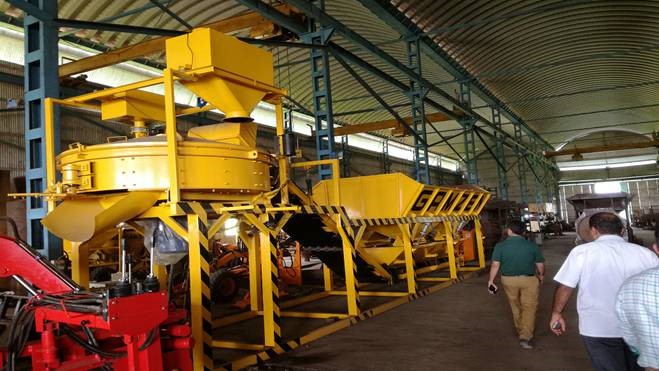The Key Role of Concrete Batching Plants in Establishing a Strong Foundation for Success
Concrete batching plants play a crucial role in the construction industry, providing the necessary concrete for the projects. They are a combination of various components that work together to ensure the consistent quality of concrete. The importance of establishing a strong foundation for success cannot be denied in any field, and the same applies to the construction industry. Without a strong foundation, the building is bound to fall apart. Concrete batching plants ensure that the building is laid on a solid foundation, ensuring its longevity. In this blog, we will discuss the significance of concrete batching plants and their role in establishing a strong foundation for success. So, let’s dive right in!
What are Concrete Batching Plants?
Concrete batching plants play a crucial role in the construction industry as they are responsible for mixing different ingredients and producing high-quality concrete. A batching plant comprises essential components such as cement silos, conveyors, aggregate bins, mixers, and control systems. These components work together to deliver concrete in large quantities as per the requirement of the project.
The working principle of the batching plant involves the mixing of water, cement, sand, and other aggregates to produce concrete. The entire process is controlled by a computerized system to ensure that the correct quantity of each component is delivered to the mixer. The plant not only ensures consistency in the quality of concrete but also increases efficiency and productivity, reduces cost, and has environmental benefits.
The components of the batching plant are designed to withstand the rigors of the construction industry, ensuring that they last for a long time. However, maintaining the equipment and machinery is crucial to avoid breakdowns and ensure safety precautions are taken. Overall, concrete batching plants are essential for any construction project and are widely used in civil engineering, road construction, bridge building, utility construction, and more.
In conclusion, concrete batching plants have revolutionized the construction industry by providing a consistent supply of high-quality concrete. They have become an indispensable component in the construction of any structure and have proven to be highly effective in providing a solid foundation for success.
Benefits of Concrete Batching Plants
Concrete batching plants have become an integral part of the construction industry, providing consistent quality concrete, increasing efficiency and productivity, cost savings, and environmental benefits.
To begin with, these plants produce concrete of consistent quality, eliminating the need for manual mixing, which can lead to variations in the strength of the concrete. The use of accurate and automated systems ensures the right mix of ingredients, resulting in high-quality concrete that is reliable and durable, and which forms a strong foundation for any structure.
Moreover, concrete batching plants allow for increased efficiency and productivity in the construction process. Manual mixing of concrete is a time-consuming process that can slow down the project’s progress and increase labor costs. In contrast, batching plants automate the mixing process, allowing for a higher volume of concrete production in a shorter period. This means that projects can be completed faster, leading to lower labor and material costs.
In addition to productivity, concrete batching plants offer cost savings to construction companies. Automating the process of concrete mixing and measurement not only saves time but also reduces waste. As the system is precise, there is minimal wastage, which translates to cost savings on materials. Furthermore, batching plants are portable, which means that companies can use them on-site, avoiding transportation costs.
Lastly, concrete batching plants provide environmental benefits. The use of automated systems reduces air pollution and noise levels as there is minimal use of manual labor and equipment, which are the primary sources of pollution. Additionally, it reduces waste concrete from being dumped into the environment, leading to a cleaner and greener earth.
In conclusion, concrete batching plants play a crucial role in the construction industry by providing consistent quality concrete, increasing efficiency and productivity, cost savings, and environmental benefits. These plants ensure the creation of strong foundations for buildings and structures, leading to safer and longer-lasting constructions.
Applications of Concrete Batching Plants
Concrete batching plants are crucial to various industries, including civil engineering, road construction, bridge building, and utility construction. These plants provide consistent and high-quality concrete mixes that form the foundation of many large-scale projects.
For civil engineering projects, concrete batching plants are used to create strong and durable structures like dams, tunnels, and buildings. In road construction, these plants produce the right mix of concrete to withstand heavy traffic and adverse weather conditions. Similarly, in bridge building and utility construction, the correct composition of concrete is critical to ensure stability and longevity.
With the increasing demand for strong foundation structures, concrete batching plants have become a necessity for these industries. It is essential to maintain these plants and their equipment to maximize their efficiency while ensuring they adhere to safety and environmental regulations.
Challenges in Concrete Batching Plants
Maintaining Equipment and Machinery is an essential aspect of working with concrete batching plants. Regular maintenance and inspection of the machinery is necessary to detect and fix issues before they lead to breakdowns that can result in project delays. Repair costs can also be a significant expense. Thus, to ensure that equipment and machinery run efficiently, regular maintenance and repairs must be carried out.
Ensuring Safety Precautions is essential in the use of concrete batching plants. Safety is necessary to protect workers from potential accidents or injuries while working with the equipment. Operators must be trained on how to use the equipment safely, and safety equipment must be provided to them.
Environmental Concerns must also be considered when using concrete batching plants. The production of concrete can generate dust, noise, and emissions that can have harmful effects on the environment. Therefore, measures must be taken to control and mitigate the impact on the environment, such as the use of dust collectors and emission control systems.
In summary, maintenance, safety, and environmental concerns must be given equal importance when using concrete batching plants. By doing so, we can avoid unexpected breakdowns, assure worker safety, and reduce the environmental impact.
Conclusion
Concrete batching plants offer consistent concrete quality, increased efficiency, cost savings, and environmental benefits. They find application in civil engineering, road, bridge, and utility construction. Proper maintenance is essential to overcome the challenges of machinery and equipment maintenance, safety, and environmental concerns. Batching plants lay the foundation for success, ensuring robust, reliable, and quality construction.

